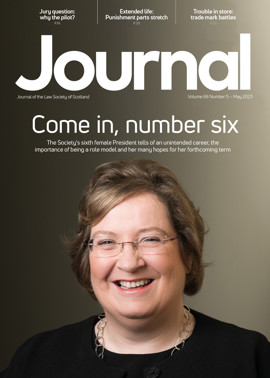Public policy highlights: May 2023
Justice Reform Bill
On 26 April the Victims, Witnesses and Justice Reform (Scotland) Bill was introduced. This follows the recent Government consultation on not proven and other reforms, to which the Criminal Law Committee responded in 2021. It highlighted its opposition to changes to the three verdict system at that stage, as well as the introduction of judge-only trials, which the committee had also successfully opposed during the introduction of emergency measures to deal with the pandemic in 2020.
The bill proposes to establish a specialist Sexual Offences Court, to reform the verdicts available to juries – which would be guilty and not guilty, to change the size and majority of juries, and also contains a power to lay regulations, following consultation, to establish a time-limited and evaluated pilot of judge-only trials for serious offences.
The Criminal Law Committee is considering the issues emerging from this legislation as the bill progresses. Fundamentally altering the balance of criminal trials is a great concern, particularly if the aim is to increase convictions in serious cases, risking breach of the right to a fair trial and potentially causing miscarriages of justice.
There are measures in the bill that the Society does support, around the right to anonymity in serious cases, the right to independent legal representation for complainers and the establishment of a Victims’ Commissioner. These will undoubtedly improve the treatment of complainers in the criminal justice system. However, resourcing of the system remains critical, particularly with the continuing decline of criminal defence practitioners in the provision of legal aid.
Additional dwelling supplement
The Society responded to the Scottish Government consultation on proposed legislative amendments to the land and buildings transaction tax additional dwelling supplement.
The response welcomed the proposed changes but regretted that they did not go further in some areas, and also called for amendments to be accompanied by clear guidance to assist taxpayers and their professional advisers.
It welcomed the proposal to extend relevant timelines from 18 to 36 months, noting that this would allow many more transactions to be covered by the rules on replacement of main residence, help divorcing and separating couples, and also align with the position in England & Wales.
Practical concerns about the proposals relating to divorce and separation were also highlighted, with a call for clarification and extension of the proposed relief to include termination of cohabitation.
The response set out a number of comments on the proposals relating to inherited property and called for the relief to apply also to properties inherited by other means on the death of a person. It also suggested potential unintended consequences of the proposals relating to small shares and joint buyers/economic unit provisions.
Finally, the response welcomed the proposed new relief for purchases of housing by local authorities and called for this to be extended to other situations where local authorities or their subsidiaries/SPVs buy houses which are to be used to provide affordable housing or accommodation for individuals with disabilities.
Data Protection Bill
The Society issued a briefing on the Data Protection and Digital Information (No 2) Bill ahead of its second reading in the House of Commons on 17 April.
Following the United Kingdom’s exit from the European Union, the bill seeks to update and simplify the UK’s data protection framework under the Data Protection Act 2018 and the UK General Data Protection Regulation. It intends to reduce burdens on organisations while ensuring high data protection standards, and will amend some provisions in the current legislation. It would also reform the Information Commissioner, namely its governance structure, duties, enforcement powers, reporting requirements, complaints processes and its development of statutory codes of practice.
The Society considers that the bill provides the Government with the opportunity to have one single, standalone, and clear piece of data protection legislation, and is concerned that the bill will mean that data protection law in the UK is contained over three main sources, namely the bill, UK GDPR and the 2018 Act, which may cause confusion for parties and organisations.
For more information see the research and policy section of the Society’s website.
Perspectives
Features
Briefings
- Civil court: Spotlight on the Sheriff Appeal Court
- Employment: Must do better – the s 23 approach
- Human rights: Crime, detention and mental health issues
- Pensions: A question of tax
- Scottish Solicitors' Discipline Tribunal: May 2023
- Family: The slide rule of grave risk
- In-house: A route to diversity






